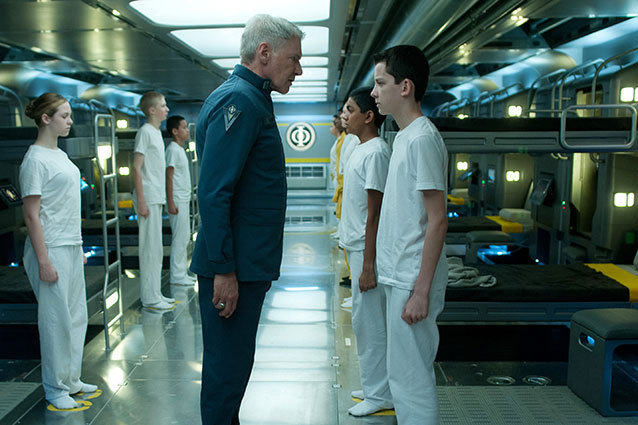
At first glance, Ender’s Game seems an obvious choice for a big-budget movie adaptation. The 1985 sci-fi yarn has sold millions of copies, been translated into 29 languages, and is on the “Suggested Reading” list for the U.S. Marine Corps. It spawned a series 11 follow-up novels, meaning major franchise potential for the studio, Summit Entertainment, that snapped up the rights. And with a plot about a boy genius in a futuristic military academy being trained to defend Earth from extraterrestrial hordes it could credibly boast the tagline that it’s “Harry Potter meets The Hunger Games.” Guaranteed box office gold, right?
Not so fast. Several experts say Ender’s Game author Orson Scott Card, also credited as a producer on the film, could pose a major problem for Summit as it begins its publicity campaign. Or, rather, his controversial politics do. Card has been at the forefront of the anti-gay marriage movement, acting as a board member of the National Organization for Marriage (NOM), which campaigned in favor of Proposition 8 in California. He’s said that if the U.S. government in any way allows states to legalize gay marriage, then the government will become his “mortal enemy,” and he will “act to destroy that government and bring it down.” He’s also advocated for sodomy laws to remain in place “to send a clear message that those who flagrantly violate society’s regulation of sexual behavior cannot be permitted to remain as acceptable, equal citizens within that society.”
In the past, the largely male, largely young, largely geeky audience for the Ender’s Game movie, directed by Gavin Hood (X-Men Origins: Wolverine), starring Harrison Ford, Ben Kingsley, and Asa Butterfield, and due to be released Nov. 1, might not have been thought of as being easily offended by such rhetoric. Today, however, with acceptance of gay rights reaching an all-time high among American youth, and geek culture at the most progressive it’s ever been, that is not the case. Summit faces a major challenge in their marketing of the Ender’s Game movie that centers on two questions sci-fi fans will be asking themselves in the months leading up to its release: Is it possible to separate a book or movie from its author’s personal views? And is that compartmentalization morally defensible?
RELATED: ‘Ender’s Game’ Finally Out of Development Hell
“The fact of the matter is that we’re already talking about the controversy surrounding the film now, and, for better or worse, the personal views of the story’s creator are going to continue to be a discussion point in the many months leading up to its release,” says Mark Umbach, a public relations and crisis management expert for Macias Media Group, a firm that helps connect entertainment industry clients, including movie studios, to the LGBT consumer base. Umbach hasn’t been brought in to consult on Summit’s promotion of the Ender’s Game movie but notes that the studio faces a major challenge in courting a gay audience for the film. “There is a huge LGBT audience for science fiction, and it’s going to be hard for those fans to separate Card’s comments from his work.”
Ari Karpel, an L.A.-based journalist who writes about movies and gay culture for The New York Times and Fast Company’s Co.Create site agrees. “The gay community has become adept at using social media to spread its opposition to perceived incidents of homophobia and really does have the power to taint the movie,” Karpel says. “While the gay audience itself is not necessarily the core audience for an Ender’s Game series of movies, the younger demographic is increasingly sensitive to gay civil rights issues. Moviegoers are savvy. It’s going to be hard to avoid making this an issue.”
As expected, the studio has not responded to Hollywood.com’s repeated requests for comment. Rich Ferraro, Vice President of Communications for the Gay & Lesbian Alliance Against Defamation (GLAAD), has released the following statement: “Anti-gay activists like Card can’t expect to spread the same hateful and dangerous rhetoric they once did without it negatively impacting how the public views them. As a board-member of NOM, one of the most visible anti-gay organizations, Card is not merely a holder of anti-gay views but someone who has used his own fame and resources to actively make life more difficult for hard-working LGBT people and our families. He might still want the buying public to financially support his creative endeavors, but the public is responding with an affirmative “no.” (Important to note: as of this report, the organization is not planning a boycott of the Ender’s Game film.)
RELATED: GLAAD Celebrates 25 Years of LGBT Images in the Media
If you just look at the book sales for Ender’s Game, that “no” doesn’t seem as affirmative. As of March 1, it’s ranked as Amazon.com’s #16 bestselling science fiction novel, above George R.R. Martin’s A Clash of Kings and A Feast for Crows and Stephen King’s 11/22/63.
However, it’s another controversy that shows what an uphill battle Summit has on its hands. DC Comics announced Feb. 6 that they’d hired Card to author a new Superman anthology. AllOut.org, a website devoted to LGBT activism, protested the hiring and has already gathered over 16,000 signatures for a petition to DC Comics to fire Card. DC Comics released a statement noting that Card’s “personal views” are not representative of the company’s, but that they “steadfastly support freedom of expression.” However, for those who could be directly affected by Card’s anti-gay marriage agenda, it’s harder to separate the Superman comic — and Ender’s Game —from its maker.

“It’s extremely difficult for the LGBT community to compartmentalize a body of work or product from its creator, because the views of the creator, who generally has a pulpit from which to speak, so intimately affect their lives and their families,” Umbach says “It’s a direct attack on the basic liberties being afforded to other Americans.”
A number of comic book writers and artists are protesting Card’s hiring themselves. Phil Jimenez, who co-authored the DC Comics Encyclopedia and has penciled Wonder Woman comics for DC and New X-Men comics for Marvel says, “The messaging readers receive through Superman is really important — he’s a symbol of honesty, fairness, goodness, and justice — and I just feel like attaching someone so virulently bigoted to the character seems to taint him for me a little, and certainly ensures I don’t buy the works authored by such an individual.”
Card’s association with Superman is surprising given how much more sensitive the comics world has become regarding gay issues and the inclusion of gay characters. DC itself recently had the original Green Lantern, Alan Scott, come out of the closet, and Batwoman has been pursuing lesbian relationships in the pages of her comics. “As a writer, I’d like to say that it’s been the creators driving this [inclusivity], but really, I think it’s been the readership that has demanded more diversity over time,” says Batwoman author W. Haden Blackman. “Readers want to see more characters that reflect who they are, or the people they know and love… I’ve encountered virtually no homophobic response to my work on Batwoman. It’s been exactly the opposite, in fact.”
NEXT: Can You Separate a Work of Art from Its Author in Today’s Geek Culture?

There certainly isn’t a 100% overlap between comics readers and the sci-fi audience that would buy a ticket to see the Ender’s Game movie, but the increasing openness in representing gay characters in comics, and the audience’s demand, including the straight audience’s demand, for that openness, is indicative of a larger shift in geek culture. “What has always impressed me about science fiction since I was a kid is that it is a progressive genre, one that explores ideas,” says Brannon Braga, wrtier/producer of the Star Trek series The Next Generation, Voyager, and Enterprise and co-creator of CBS’ Threshold and Fox’s Terra Nova. “In exploring ideas you can’t be closed minded. By definition, science fiction is also humanitarian.”
RELATED: Obama Was Right About that ‘Jedi Mind Meld’
One thing that might work in Summit’s favor is the fact that the general audience just doesn’t know much about Card’s homophobia — if they know much about him at all. Aside from his placement on the board of the National Organization for Marriage, he’s expressed most of his anti-gay views to Mormon publications. “I didn’t know Orson Scott Card had some hateful aspects to his personality,” says Braga. “I would assume that if people do find out about the author’s point of view, it would have an impact. It’d be almost like dealing with a Scientology book. It’s a little hard to separate Battlefield Earth from its origin. L. Ron Hubbard may not have written it as a Scientology book per se, but it’s difficult when you’re reading it not to think, ‘Oh yeah, this is by the guy who founded Scientology.’”
Though groups like AllOut.org and GLAAD are trying to raise awareness, Card’s past isn’t a talking point for the run-0f-the-mill moviegoer. But the web-savvy sci-fi fans who will be the core audience for an Ender’s Game movie are much more in tune. That could be a problem, since those sci-fi fans are going to be responsible for building buzz and creating a consensus about the movie on social media leading up and after Ender’s Game’s release. Not to mention that within geek culture authors and their creations, whether books, movies, or TV shows, have never been more closely linked. Don’t like the Star Wars prequels? Blame George Lucas! Hate Twilight? Bash Stephenie Meyer! Still fuming over that LOST finale? Accost Damon Lindelof and Carlton Cuse on Twitter! Love Harry Potter? Build shrine to J.K. Rowling! It’s harder than ever to separate an author’s personality and priorities from the worldview he or she projects through a work of art. “I loved Apocalypto,” Braga says. “I think it’s a masterwork of filmmaking. But it’s hard to separate it from Mel Gibson’s anti-Semitic remarks that he made so near to the release of the film. And when I think of Apocalypto, I definitely do think of that.”
The box office track record of movies with these kinds of controversies isn’t exactly stellar. Gibson’s rant certainly didn’t help Apocalypto, and it grossed only $50 million in 2006, though, anti-Semitic comments or not, the ancient Mayan epic was never going to be a hit. More tellingly, Brett Ratner compounded the already bad buzz surrounding his 2011 film Tower Heist when he infamous said “rehearsals are for f**s,” the comment that forced him to resign from producing the Oscars, the weekend of his film’s release. Making only $78 million, it became his lowest grossing comedy in 11 years. And Ron Howard’s The Dilemma flat-out bombed in January 2011 following a backlash over Vince Vaughn’s pejorative use of “gay” in a trailer.
It’s impossible to know whether the controversies surrounding these filmmakers negatively affected their movies, especially given that those films were of questionable quality to begin with. But let’s put it this way: the controversies certainly didn’t help. What happens, though, if unlike The Dilemma, Tower Heist, and Apocalypto, the Ender’s Game movie turns out to be really good? “If the movie is great all else will fall away,” Karpel says. Braga agrees. “If Card’s vision is powerful enough and unique enough, the work can stand for itself.”
NEXT: Summit’s Strategy for Dealing With the Anti-Card Backlash May Be Very, Very Simple.
That’s why Summit’s approach in addressing Card’s inflammatory views will likely be to just ignore them outright.
“That might be possible,” Karpel says. “Summit is the studio that managed to maintain Twilight‘s cultural dominance amidst a scandal that could have toppled it: the revelation that Kristen Stewart had cheated on Robert Pattinson with Rupert Sanders, her Snow White and the Huntsman director. Summit expertly maneuvered through that one, but the controversy does seem to have had lingering effects for Stewart, who is not as beloved as she once was.” Hollywood studios have mastered the ability at circling the wagons and preventing controversial discussions from even starting, and that cone of silence doesn’t only extend to employees on their payroll. Several crisis management experts were approached to comment on this piece, and, other than Mark Umbach, all declined to contribute. Braga himself candidly admits, “It’s better in Hollywood to just lay low on issues like this. The only reason I’m giving [this interview], honestly, is because I really think there is something terrible and ultimately corruptible about hate and judging people as a group rather than considering them as individuals. It’s disgusting when people express the kinds of views this author has expressed and I felt a moral obligation to at least chime in.”
RELATED: ‘Star Wars’ Authors on How to Make the Best Episode VII
Likewise, the studio isn’t commenting at all on its strategy for promoting the film and, eight months before its release, it’s possible that they themselves haven’t hammered out their strategy. However, if they follow the template they used to market the final Twilight film in the wake of Kristen Stewart cheating scandal, that means one thing in particular could happen: Card could be left out of the film’s publicity. It seems almost unthinkable. It’d be like marketing the Harry Potter movies without J.K. Rowling. But leaving him out of the discussion may be preferable to putting him on a panel before a crowd of thousands in Hall H at Comic Con, where he might face questions that will distract from the film. “We have a whole younger generation who may not understand why marriage equality is even a debate topic,” Umbach says. “And those are people that are going to be in the audience at Comic Con. Putting Card in front of a huge audience may draw attention away from the film and put the focus on his personal ideologies, which could distract from the purpose of taking the principles to the convention…to support the film.”
Even if we can say that it is indeed possible to separate an author from his work, it seems undeniable that purchasing a ticket to the Ender’s Game movie is in fact funding Card’s politics. “I’d say that’s case,” Braga says. “If an author’s political views are so pronounced and have been articulated vocally enough that you are aware of them, I think there is a social responsibility behind your choice to buy a ticket.” Which is also to say that you can support Card’s right to “freedom of expression” without having to endorse those views with your dollars. Adds Blackman, “I shouldn’t somehow feel compelled to buy something created by someone who will use that money to persecute or restrict the rights of my loved ones.”
But in Hollywood, money is king, and the fact that some people feel that way can’t be good news to Summit. They’ll need a strategist like Ender himself to play this game.
Follow Christian Blauvelt on Twitter @Ctblauvelt
[Photo Credits: Richard Foreman Jr./Summit Entertainment, DC Comics]
From Our Partners: 40 Most Revealing See-Through Red Carpet Looks (Vh1)
40 Most Revealing See-Through Red Carpet Looks (Vh1) 33 Child Stars: Where Are They Now? (Celebuzz)
33 Child Stars: Where Are They Now? (Celebuzz)


